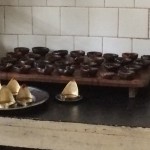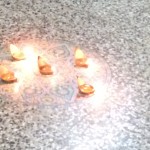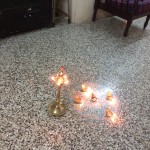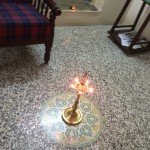Growing up as a Hindu in a predominantly Hindu neighbourhood, I shouldn’t have been exposed to Christmas as much – especially in the 80s.
But I had a friend who was Christian (a few friends who are still good friends). I used to visit his place often –practically lived there – and I learnt about Good Friday, Easter, Palm Sunday, Christmas Eve, Midnight mass and nativity scenes (which is called Christmas Crib in India) .  I went to midnight mass as a teenager much to the grief of my religious orthodox Hindu parents. I liked the bustle of organized religion. They all sang songs together – they knew these songs – and Hinduism except in a small way is not organized.
I went to midnight mass as a teenager much to the grief of my religious orthodox Hindu parents. I liked the bustle of organized religion. They all sang songs together – they knew these songs – and Hinduism except in a small way is not organized.
India is organized chaos and so is Hinduism in many ways. We all go to temples whenever we like, there are some specific exceptions. And we all prayed to a myriad of gods and goddesses, we had many festivals throughout the year, many anniversaries of special full-moons and new-moons to celebrate, it was difficult to be organized so often in a week. It is more of the personal relationship with their own God. My Dad was quite religious and ritualistic and he did all his prayers at home.
I knew about Santa Claus and the reindeer – but not in a big way – not like the Indian kids of today. We didn’t have too much fanfare during Christmas. Every street would have one or two Christian residents, and they would have a star hanging outside their house lit up with lights. Some had trees and some didn’t. We have those Christmas trees in abundance in the coast. People sang carols and came to the various Christian homes. They knew where the parishioners lived and they went from one home to another singing songs. I would sit by the window and watch.
I don’t think Enid Blyton wrote a lot of Christmas stories. Did she? I can’t recall reading any that explained Santa Claus or using him as a character. Maybe it was Father Christmas in the UK and Raymond Briggs’s books didn’t come to India.
And then when I moved to Singapore, I saw the decorations in the shopping district.  The enormous Christmas Tree in their biggest mall and it was fun to watch. Chinese New Year was bigger than Christmas and hence although Singapore celebrated Christmas, it was only second to CNY which was also a 3-day holiday. I did attend midnight-mass once there, my first Christmas there. (Don’t ask me why).
The enormous Christmas Tree in their biggest mall and it was fun to watch. Chinese New Year was bigger than Christmas and hence although Singapore celebrated Christmas, it was only second to CNY which was also a 3-day holiday. I did attend midnight-mass once there, my first Christmas there. (Don’t ask me why).  When I worked there, I had Japanese clients – and they didn’t do Christmas holiday – so we too had to take turns to work. That’s when I discovered that not all countries gave it the same importance and then I realized the effect of being a British colony vs not being one.
When I worked there, I had Japanese clients – and they didn’t do Christmas holiday – so we too had to take turns to work. That’s when I discovered that not all countries gave it the same importance and then I realized the effect of being a British colony vs not being one.
I also had the most traumatic experience of being in Singapore during the Tsunami 10 years ago and waking up my parents to ask about it – and they were like we felt tremors, we went back to sleep and then found out it had wiped out the coast in our city and miles beyond. We had reservations at another coast in Malaysia and we had to triple check everything before we went on that holiday – everything was great except we weren’t allowed on the beach and we snuck in anyway.
When I moved to the UK, Christmas was not really a great time because everything shuts down. From where I come, holidays don’t keep shops closed. Even the big ones like Diwali – because we consider the festivals to be auspicious – the shops remain open on auspicious days. Only Christian shops used to be closed in Chennai on Christmas and that was a handful of grocery stores run by a specific community of people who were Christians.
I didn’t fully understand “Nothing is open” until my first Christmas when no shops, no supermarkets, no buses, no trains. I use public transport for everything and I was stranded.
But there is a silver lining – it was my time of quiet – two days of quiet when I could write – no one would bother me on those days whatever happens. The Christmas weeks were quiet at work. Many took time off and I usually covered Christmas. So that meant quieter at work, less workload and more time to get to know the people who did come to work.
Slowly that too has changed – my Christmas graph from childhood to today seems to fluctuate. Now I’m part of my sister’s family celebrating Christmas.
I know Christmas is filled with the stress of buying gifts, cooking food, going somewhere on time with the trains being as they are and all that. I also know where there is family, there would be squabble. We wouldn’t fight with strangers – just family. That’s what love is all about.
And the other best thing for me for Christmas is that Facebook is filled with good wishes, happy videos and the TV news is filled with heart-warming stories of people who are generous and find a way to include others in their celebration.
We have a tree this time,  presents (which I always overdo and buy lots), board games, Christmas movies and the works. And I have a nephew (and soon to be two) who loves to read books with me and loves the Big Tree in his house with baubles, surely I’m going to be celebrating as many Christmases I could with them. A great time for mulled wine (which I love), cooking food for a big group, singing songs (out of tune) and enjoying the company of people you love.
presents (which I always overdo and buy lots), board games, Christmas movies and the works. And I have a nephew (and soon to be two) who loves to read books with me and loves the Big Tree in his house with baubles, surely I’m going to be celebrating as many Christmases I could with them. A great time for mulled wine (which I love), cooking food for a big group, singing songs (out of tune) and enjoying the company of people you love.
I think I get it. It’s not very different from Diwali, except for the absence of presents and tree, and with firecrackers – it is about families and friends coming together, good food and making merry with the people you love and care about. The trimmings are different across the religions and countries and communities, the food on the table is different – but the love and cheer – that crosses all boundaries.
I always think (I think a lot during this time of the year), take away the rituals and the external practices, underneath we want the same things, we enjoy the same things, we love for the same reasons and laugh for the same reasons.
 From Falgu and yours truly, Merry Christmas folks! Hope you all have a wonderful time.
From Falgu and yours truly, Merry Christmas folks! Hope you all have a wonderful time.










 I have so many new ideas since I came a week ago. I went to some beautiful old places in Delhi and Chennai, listened to sounds and breathed in smells of this place. Now what I need is a route map to convert one of the ideas into a story without getting lost. It needs patience – the patience to find my way, the patience to finish the journey even if i have to make a lot of detours and wrong turns. I need to trust my driving and not worry about the lanes. I need to make eye-contact with the characters I create and not just wait for traffic lights to tell me how to proceed.
I have so many new ideas since I came a week ago. I went to some beautiful old places in Delhi and Chennai, listened to sounds and breathed in smells of this place. Now what I need is a route map to convert one of the ideas into a story without getting lost. It needs patience – the patience to find my way, the patience to finish the journey even if i have to make a lot of detours and wrong turns. I need to trust my driving and not worry about the lanes. I need to make eye-contact with the characters I create and not just wait for traffic lights to tell me how to proceed.  And of course call upon the myriad gods in bronze, wood and stone to guide me .
And of course call upon the myriad gods in bronze, wood and stone to guide me .  I am heading to one of the oldest libraries in Chennai – the Connemara this week before I head back to London to find some research on the ideas I have. This trip has been inspiring in many ways – and the traffic is one of those urban miracles in India that has triggered me to draw the parallels with my writing.
I am heading to one of the oldest libraries in Chennai – the Connemara this week before I head back to London to find some research on the ideas I have. This trip has been inspiring in many ways – and the traffic is one of those urban miracles in India that has triggered me to draw the parallels with my writing.